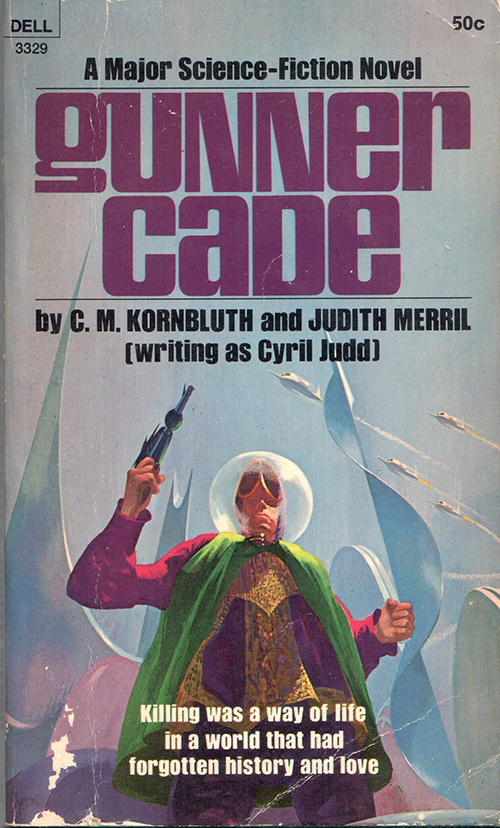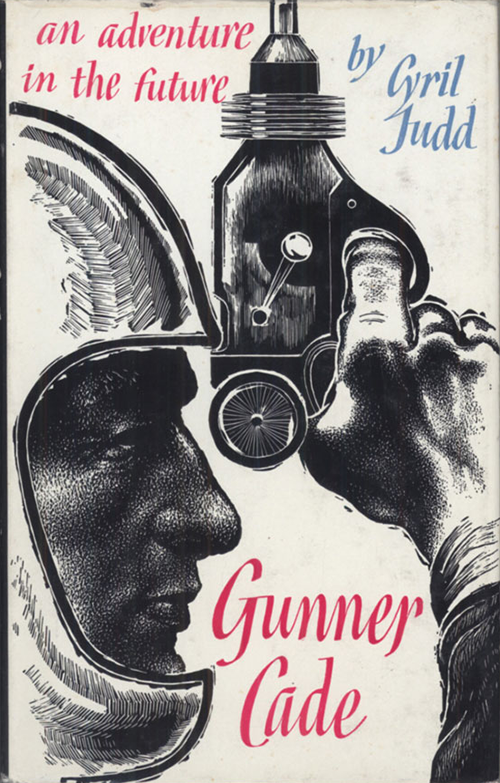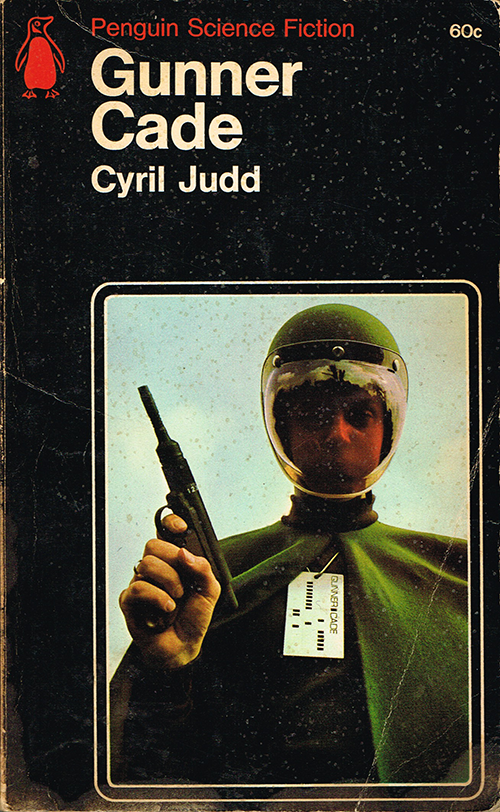Gunner Cade, published in 1952, was written by Cyril Judd. The author is not a relative of Donald Judd but is instead a pseudonym for the collaboration of Cyril M Kornbluth and Judith Merril. I haven’t read anything by Merril before but I have read Wolfbane, which Kornbluth wrote with Frederick Pohl and I highly recommend. Merril and Kornbluth both wrote more short stories than novels. Merril was one of the most influential people writing SF in the 50s and later moved to Toronto and was very prominent in the Canadian SF and protest scenes. She founded a SF library collection, an anthology, and most memorably dressed up as a witch to hex the Canadian parliament for allowing U.S. missile tests in Canadian airspace. Kornbluth wrote many collaborative novels but unfortunately died at the peak of his powers in his mid 30’s from a heart attack.
Cover by Paul Lehr.
Gunner Cade is a short, swiftly-paced SF novel that includes some incisive social commentary. The titular Cade lives in a far future Earth with an interplanetary society locked in stasis by the interplay between the emperor, nobles who rule different regions such as France and Mars (called Stars), the general (called the Gunner Supreme), and the spymaster (called the Power Master (has CF read this?)). The Gunners are warrior-priests who live an austere, celibate life of ritual centered on their one gun and fatalistic devotion to battle.
Gunner Cade is a classic one-person-against-the-world SF novel, similar to AE Van Vogt’s hyper-kinetic power fantasies such as Slan or The World of Null-A and Philip K Dick’s paranoid visions such as Flow my Tears the Policeman Said. As is standard with these books, the protagonist, usually a man of inhuman skill and intelligence (although interestingly in this case Gunner Cade has trouble with social cues due to his isolated life in the militaristic convent), is cast out of society and discovers a vast conspiracy that reveals that everything they thought was true is a lie.
Cover by Paul Bacon.
Warning, some spoilers in this paragraph. In Gunner Cade, the lies are that the Emperor, Stars, Gunner Supreme, and Power Master all work together in harmony to protect and nurture the commoners and gunners and that the world was created from nothing ten thousand years ago with this whole system already intact. In reality, a system of checks and balance keeps any one person from taking over by occupying everyone with superfluous warfare. We also discover that this world has rejected science because science caused a nuclear apocalypse. But this ignorance will lead to ruin again as the Earth and Mars are mined of all their natural resources such as uranium and iron. There are also some funny passages in the beginning that reveal that the guiding philosophy (it’s called Klin philosophy but I don’t get the reference, does anyone know it?) is based on a misinterpretation of common words such as “fiddling,” “crooks,” and “governors” that causes the people of the future to think that their sacred texts mean the opposite of their author’s intention.
Cover by Ian Yeomans.
The female characters in this book are more interesting and well-rounded than in most SF of this type and time, which makes sense when one of the writers is a woman. From Gunner Cade’s naive perspective as a celibate who’s had no contact with women since childhood, women are mysterious, alluring perils that will destroy his vows. But this isn’t the perspective of the text. There are several women in different social roles who send the plot on different trajectories and, both intentionally and inadvertently, reveal to Cade truths about society and history. By the end of the novel he sees women as people, or at least the one woman with whom he falls in love, a woman who makes it clear to Cade that she follows her own agenda.
Gunner Cade is a slim 160 pages, I read it in four sittings. It’s a fun, fast read if you can find a copy.
As an aside, I’ve been thinking about the length of contemporary genre novels. Are our novels growing ever larger because it’s easier it is to write a hefty tome on a computer instead of a typewriter? Sometimes I prefer quick novels and novellas. It seems like eBooks can make that easier. Barbara Hambly, one of my favorite fantasy authors, can’t find a publisher willing to put out new books in the series she wrote in the 80’s. So instead, she sells digital copies of short stories directly through her website.



